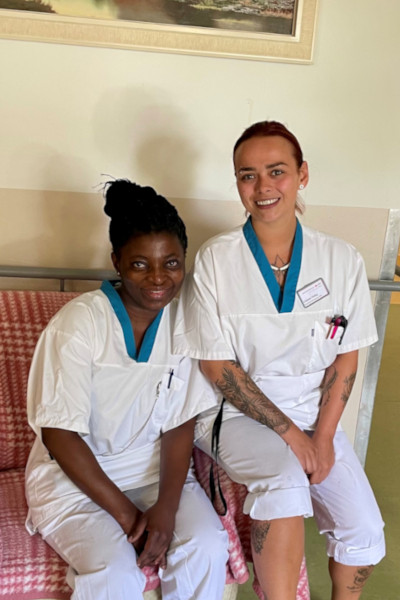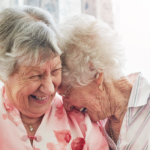Retirement home lets residents sleep in and gains new skilled workers as a result.
Wake-up call at 6:30 a.m. Then it is time to wash and be seated at the breakfast table in the dining room by 8 a.m. at the latest. This is still the morning routine in many nursing homes in Germany.
“The question is why,” says Susanne Mezger from SSG-Seniorenwohnen in Augsburg-Haunstetten. The 50-year-old manages the home and, together with her team led by nursing manager Stephanie Holzwarth, has broken with this rule in a pilot project.
Sleeping in for a better quality of life
In living area four, the approximately 40 residents can sleep in as long as they want. They can even have breakfast in bed. Mezger has a master’s degree in health management and worked in a hospital for many years. “A strict morning routine makes sense there because operations are scheduled,” says the trained social pedagogue. However, Mezger is certain that senior living is not about case numbers, but about improving quality of life, and that includes sleeping in.
She and her colleague Holzwarth agree that even in old age, they do not want to be woken up passively, as it is often the case in nursing homes. “In the morning, the door to the room is opened and the hallway light is turned on,” says Mezger, describing procedures that have been standard practice in her home for decades.
Attention instead of processing
In some homes, contrary to guidelines, the night shift sometimes begins with personal hygiene – which increases the pressure of work. And the residents experience the well-intentioned care more as a quick process than as loving attention. In addition, the staff’s constant glances at the clock cause stress. “But we don’t want that,” says Mezger, advocating a slower start to the day.
New processes, new colleagues

Of course, the new routine brings changes. Not all employees like the new flexibility at first. The kitchen and housekeeping departments have to adapt their work processes. “But this doesn’t create more work,” says Holzwarth, who works closely with residential area manager Chantel Viebig to calm any unrest in the team.
This is also due to four newly hired colleagues. Their shift now starts at 8:30 a.m. instead of two hours earlier as before. One of them is Agathe Yango. The 33-year-old comes from Cameroon and has been living in Augsburg since 2016. She completed a one-year training program to become a nursing assistant and is a single mother of a three-year-old daughter.
First job as a mom
Yango applied to various organizations several times. Her request to start work at 8:30 a.m. was flatly rejected by all of them. As a mother, she is dependent on the opening hours of the daycare center, which she cannot choose due to a lack of places, and then has to take the bus to the senior citizens‘ residence.
Not so Susanne Mezger. The Augsburg facility manager hired Yango because she fits into the new sleep-in concept of the home. “We call it the mom shift,” Mezger explains. And Holzwarth explains the system: Each early shift consists of a specialist who works from 6:30 a.m. to 2:45 p.m. and takes on the so-called “long shift” internally. They are supported by an assistant. From 8:30 a.m., the women who have a mom shift – like Yango – join them.
The coup: attracting skilled workers
“With the new model, we can attract skilled workers who previously fell through the cracks,” says Mezger, delighted with the coup that is making the BRK facility, with around 120 care places and around 90 employees, more flexible. At the same time, she admits that the “revolution” needed a push. The background to this is the Nursing Staff Assessment Act, which came into force two years ago.
It is complex, but roughly speaking, it stipulates the quality levels required for individual care tasks for residents. For example, medication may only be administered by qualified personnel. For basic personal care, the quality level may vary and can also be performed by nursing assistants.
No more temporary workers thanks to sleeping in
What appears to be more work in practice, because logistics, documentation, and human care have to be reorganized, is forcing operators to offer their employees flexible options. “Among other things, this means we are no longer dependent on temporary workers,” Mezger observes. In Augsburg-Haunstetten, this has given rise to the Mama Service, which is also available to fathers. The sleeping in of the residents is a second benefit.


